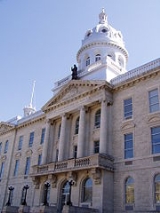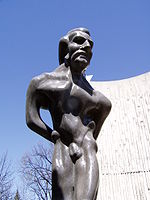
Collège universitaire de Saint-Boniface
Encyclopedia
The Université de Saint-Boniface, or USB, is a university college
affiliated with the University of Manitoba
and located in the Saint Boniface
district of Winnipeg, Manitoba
, Canada
.
It is oriented primarily towards the French-speaking community of Saint Boniface and others who want to learn, or be educated through, the French language and Franco-Manitoban culture
.
 St-Boniface College has a strong Roman Catholic religious affiliation. It originates from a classical school for young men founded on January 12, 1819 by Monseigneur
St-Boniface College has a strong Roman Catholic religious affiliation. It originates from a classical school for young men founded on January 12, 1819 by Monseigneur
Norbert Provencher
. It was incorporated into its current form in 1871.
Consolidation was a way to strengthen this small and financially insecure institution. The University Of Manitoba was established in 1877 as a classic college for men, St. Boniface College. It was established by combining three existing church colleges: St. Boniface Roman Catholic, St John's
Anglican, and Manitoba College
Presbyterian. On May 3, 1871, the Manitoba legislature issued a charter to St. Boniface College.
In the early part of this century, professional education expanded beyond the traditional fields of theology, law and medicine. Graduate training based on the German-inspired American model of specialized course work and the completion of a research thesis was introduced.
The policy of university education initiated in the 1960s responded to population pressure and the belief that higher education was a key to social justice and economic productivity for individuals and for society.
By 2002 the college population was about two-thirds female.
In 2011, the university changed its named from Collège universitaire de Saint-Boniface to Université de Saint-Boniface
division, who study in the main building which is located right next to St. Boniface Cathedral, and a block away from Boulevard Provencher, the street located in the middle of St. Boniface and at the heart of the Franco-Manitoban
community.
Identity provides research into Aboriginal culture.
University college
The term "university college" is used in a number of countries to denote college institutions that provide tertiary education but do not have full or independent university status. A university college is often part of a larger university...
affiliated with the University of Manitoba
University of Manitoba
The University of Manitoba , in Winnipeg, Manitoba, Canada, is the largest university in the province of Manitoba. It is Manitoba's most comprehensive and only research-intensive post-secondary educational institution. It was founded in 1877, making it Western Canada’s first university. It placed...
and located in the Saint Boniface
Saint Boniface, Manitoba
Saint Boniface is a city ward of Winnipeg, home to much of the Franco-Manitoban community. It features such landmarks as the Cathédrale de Saint Boniface , Boulevard Provencher, the Provencher Bridge, Esplanade Riel, St. Boniface Hospital, the Collège universitaire de Saint-Boniface and the Royal...
district of Winnipeg, Manitoba
Winnipeg
Winnipeg is the capital and largest city of Manitoba, Canada, and is the primary municipality of the Winnipeg Capital Region, with more than half of Manitoba's population. It is located near the longitudinal centre of North America, at the confluence of the Red and Assiniboine Rivers .The name...
, Canada
Canada
Canada is a North American country consisting of ten provinces and three territories. Located in the northern part of the continent, it extends from the Atlantic Ocean in the east to the Pacific Ocean in the west, and northward into the Arctic Ocean...
.
It is oriented primarily towards the French-speaking community of Saint Boniface and others who want to learn, or be educated through, the French language and Franco-Manitoban culture
Franco-Manitoban
Franco-Manitobans are a community of French Canadians and other French-speaking people living in Manitoba. Most Franco-Manitobans have roots in Quebec. However, many are of Métis and Belgian ancestry while others have ancestors that came directly from France, its former colonies and other...
.
History

Monseigneur
Monseigneur is an honorific in the French language. It has occasional English use as well, as it may be a title before the name of a French prelate, a member of a royal family or other dignitary. Also it is sometimes used as a name for a Frenchman who has a position on the court.Monsignor is both...
Norbert Provencher
Norbert Provencher
Joseph-Norbert Provencher was a Canadian clergyman and missionary and one of the founders of the modern province of Manitoba. He was the first Bishop of Saint Boniface and was an important figure in the history of the Franco-Manitoban community.Provencher was born in Nicolet, Quebec in 1787, and...
. It was incorporated into its current form in 1871.
Consolidation was a way to strengthen this small and financially insecure institution. The University Of Manitoba was established in 1877 as a classic college for men, St. Boniface College. It was established by combining three existing church colleges: St. Boniface Roman Catholic, St John's
St. John's College, University of Manitoba
St John's College is a small Anglican college located on the University of Manitoba campus in Winnipeg, Canada. It is home to the Institute for Anglican Ministry, a ministry of the Diocese of Rupert's Land that seeks to train Anglican lay people.-History:...
Anglican, and Manitoba College
Manitoba College
Manitoba College was a college that existed in Winnipeg, Manitoba, Canada from 1871 to 1967, when it became one of the University of Winnipeg's founding colleges. It was one of the first institutions of higher learning in the city of Winnipeg and the province of Manitoba...
Presbyterian. On May 3, 1871, the Manitoba legislature issued a charter to St. Boniface College.
In the early part of this century, professional education expanded beyond the traditional fields of theology, law and medicine. Graduate training based on the German-inspired American model of specialized course work and the completion of a research thesis was introduced.
The policy of university education initiated in the 1960s responded to population pressure and the belief that higher education was a key to social justice and economic productivity for individuals and for society.
By 2002 the college population was about two-thirds female.
In 2011, the university changed its named from Collège universitaire de Saint-Boniface to Université de Saint-Boniface
Academic
It has about 1,000 regular students and 3,000 in its continuing educationContinuing education
Continuing education is an all-encompassing term within a broad spectrum of post-secondary learning activities and programs. The term is used mainly in the United States and Canada...
division, who study in the main building which is located right next to St. Boniface Cathedral, and a block away from Boulevard Provencher, the street located in the middle of St. Boniface and at the heart of the Franco-Manitoban
Franco-Manitoban
Franco-Manitobans are a community of French Canadians and other French-speaking people living in Manitoba. Most Franco-Manitobans have roots in Quebec. However, many are of Métis and Belgian ancestry while others have ancestors that came directly from France, its former colonies and other...
community.
Partnership
The Université de Saint-Boniface is a member of L'Association des universités de la francophonie canadienne, a network of academic institutions of the Canadian Francophonie.Aboriginal
The Université de Saint-Boniface’s Canada Research Chair on MétisIdentity provides research into Aboriginal culture.
See also
- List of universities in Manitoba
- Higher education in ManitobaHigher education in ManitobaHigher education in Manitoba traces the development and expansion of higher education in the Canadian province of Manitoba...
- Education in CanadaEducation in CanadaEducation in Canada is for the most part provided publicly, funded and overseen by federal, provincial, and local governments. Education is within provincial jurisdiction and the curriculum is overseen by the province. Education in Canada is generally divided into primary education, followed by...
- St Boniface's Catholic College, Plymouth, England
Histories
- Dr. John M (Jack) Bumsted 'The University of Manitoba: An Illustrated History (Winnipeg: University of Manitoba Press © 2001)'
- W. J. Frazer "A History of St. John's College, Winnipeg." M.A. thesis, University of Manitoba, 1966.
- Mary Kinnear "Disappointment in Discourse: Women University Professors at the University of Manitoba before 1970." Historical Studies in Education 4, no. 2 (Fall 1992).
- P.R. Régnier "A History of St. Boniface College." M.A. thesis, University of Manitoba, 1964.
External links
- http://www.ustboniface.mb.ca/ Université de Saint-Boniface (in French)
- http://www.cusb.info/ Université de Saint-Boniface - Recruitment (in French)
- Université de Saint-Boniface

